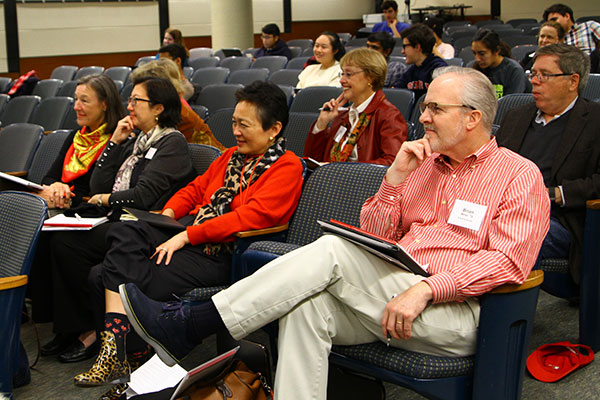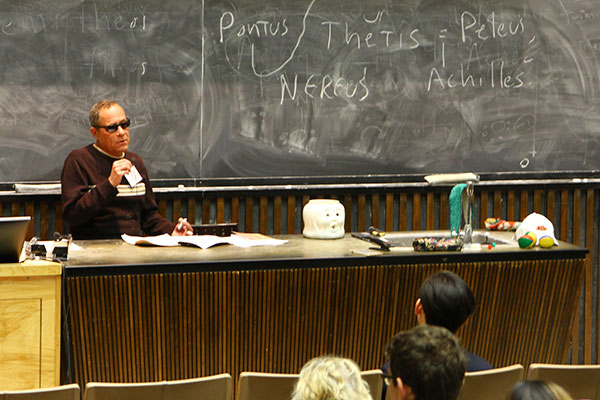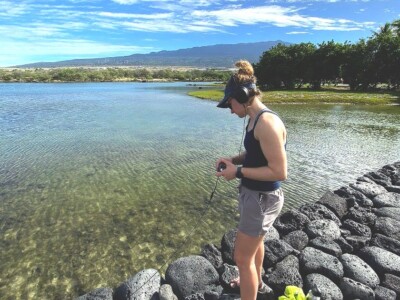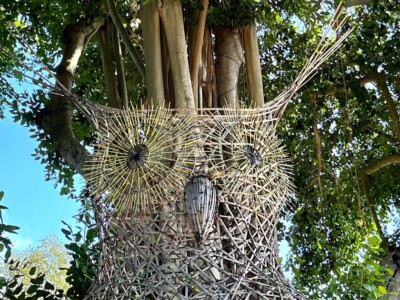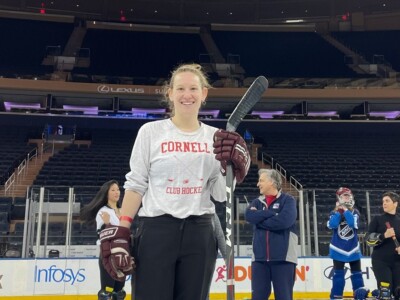Members of the Cornell University Council (CUC) had the opportunity to join students in the classroom on October 27, the first day of the 66th Trustee-Council Annual Meeting (TCAM).
Seventeen courses were offered; in lecture halls across campus, more than 200 council members had front-row seats to intellectual discussions. In the College of Arts and Sciences, David Mankin, associate professor of classics, gave a lecture in his Greek Mythology class about the characteristics of heroes in Hesiod’s Homeric Hymn to Aphrodite.
“Zeus is the god with a plan,” he said. “Zeus always has a plan.”
In the College of Engineering, Park Doing ’88, MEng ’93, MA ’00, PhD ’03, lecturer in the Department of Electrical and Computer Engineering, showed YouTube clips of the Beach Boys to introduce ethical issues related to self-driving vehicles. American car culture after WWII, he pointed out, represented the values of autonomy, freedom, and individuality.
“How would these things be affected by the car driving?” he said. “What kinds of complications do you encounter when you allocate responsibility to autonomous systems?”
One of the goals of TCAM weekend, said Raj Chandnani ’95, council member and chair of the TCAM planning committee, is to inform and inspire alumni leaders about what’s going on at Cornell.
“When I come back to campus, I always try to go to at least one class,” he said. As a student, he liked the feeling of “integrating into the fabric of the university.” However, as a council member returning for TCAM weekends, he often felt isolated from the intellectual life of the campus, attending meetings while students scurried to class.
This year, to better integrate council members and trustees into the fabric of the university, Chadnani said that he and other planners coordinated TCAM events closely with the class schedule, and council members had the opportunity to attend an afternoon class.
The classroom experience increased council members’ contact with academic life and honored the vision of late President Elizabeth Garrett, said Catherine Holmes MS ’85, associate director of volunteer programs in the Division of Alumni Affairs and Development (AAD).
“In her inaugural address, she stressed a commitment to faculty, students, and Cornell’s dual footprint in Ithaca and New York,” said Holmes. “The classroom experience highlights faculty.”
The 17 participating faculty members were gracious, said Holmes, welcoming the council members in their planned lectures, discussions, and activities. Two professors even gave their alumni students homework.
“CUC members value learning and want to participate in it in a real, not fabricated way,” said Laura Denbow, senior director of volunteer programs in AAD. “They want to see firsthand how students and faculty interact. They want to better understand what it feels like to be a current student at Cornell and how it’s the same or different from their experience.”
Council member Renee Gossett ’80, DVM ’86 said the classroom experience has not changed much since she was a student. She attended America’s Promise: Social and Political Context of American Education, taught in the College of Agriculture and Life Sciences, because her daughter, a junior, was in the class.
“This was much more interactive than I remember,” said government major Jay Silpe ’94, after sitting in on Constitutional Law and US Politics taught by Joseph Margulies ’82, professor of law and government at the Cornell Law School.
Alan Cody ’69 chose the Nutrition and Disease course taught by Marie Caudill, professor of nutritional sciences in the College of Human Ecology.
“I thought it would provide some helpful advice for me at my age regarding eating choices,” he said. “In fact, it turned out to be a class focused on a very specific topic, the management of diabetic kidney disease.”
Cody learned how profoundly the teaching and research at Cornell influences lives.
“I have known many people with diabetes and saw Cornell students learning in this class how to manage this disease,” he said. “I then truly understood how our lives are never very far away from Cornell and all it is doing to advance human life.”

